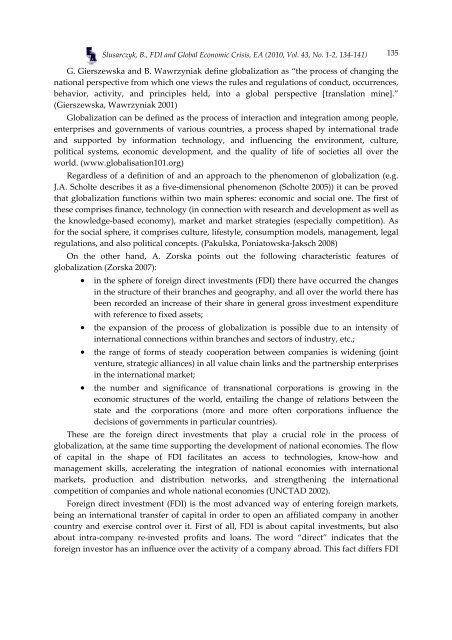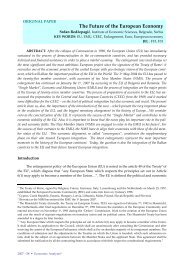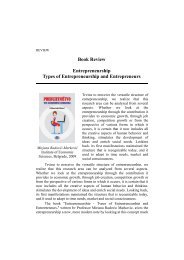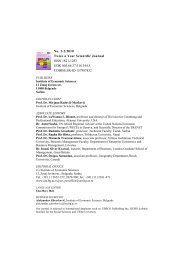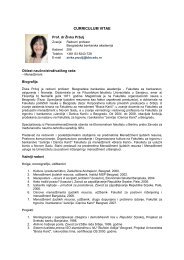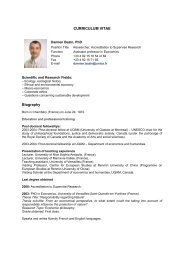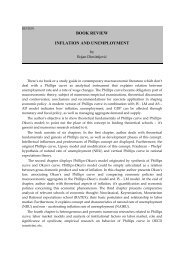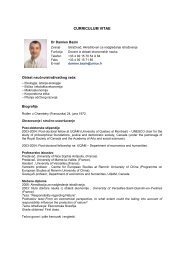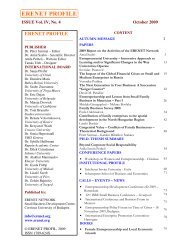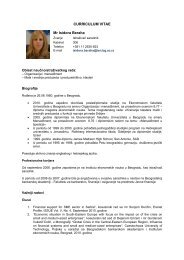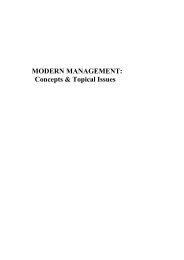Twice a Year Scientific Journal
Twice a Year Scientific Journal
Twice a Year Scientific Journal
You also want an ePaper? Increase the reach of your titles
YUMPU automatically turns print PDFs into web optimized ePapers that Google loves.
Ślusarczyk, B., FDI and Global Economic Crisis, EA (2010, Vol. 43, No. 1-2, 134-141) 135<br />
G. Gierszewska and B. Wawrzyniak define globalization as “the process of changing the<br />
national perspective from which one views the rules and regulations of conduct, occurrences,<br />
behavior, activity, and principles held, into a global perspective [translation mine].”<br />
(Gierszewska, Wawrzyniak 2001)<br />
Globalization can be defined as the process of interaction and integration among people,<br />
enterprises and governments of various countries, a process shaped by international trade<br />
and supported by information technology, and influencing the environment, culture,<br />
political systems, economic development, and the quality of life of societies all over the<br />
world. (www.globalisation101.org)<br />
Regardless of a definition of and an approach to the phenomenon of globalization (e.g.<br />
J.A. Scholte describes it as a five-dimensional phenomenon (Scholte 2005)) it can be proved<br />
that globalization functions within two main spheres: economic and social one. The first of<br />
these comprises finance, technology (in connection with research and development as well as<br />
the knowledge-based economy), market and market strategies (especially competition). As<br />
for the social sphere, it comprises culture, lifestyle, consumption models, management, legal<br />
regulations, and also political concepts. (Pakulska, Poniatowska-Jaksch 2008)<br />
On the other hand, A. Zorska points out the following characteristic features of<br />
globalization (Zorska 2007):<br />
• in the sphere of foreign direct investments (FDI) there have occurred the changes<br />
in the structure of their branches and geography, and all over the world there has<br />
been recorded an increase of their share in general gross investment expenditure<br />
with reference to fixed assets;<br />
• the expansion of the process of globalization is possible due to an intensity of<br />
international connections within branches and sectors of industry, etc.;<br />
• the range of forms of steady cooperation between companies is widening (joint<br />
venture, strategic alliances) in all value chain links and the partnership enterprises<br />
in the international market;<br />
• the number and significance of transnational corporations is growing in the<br />
economic structures of the world, entailing the change of relations between the<br />
state and the corporations (more and more often corporations influence the<br />
decisions of governments in particular countries).<br />
These are the foreign direct investments that play a crucial role in the process of<br />
globalization, at the same time supporting the development of national economies. The flow<br />
of capital in the shape of FDI facilitates an access to technologies, know-how and<br />
management skills, accelerating the integration of national economies with international<br />
markets, production and distribution networks, and strengthening the international<br />
competition of companies and whole national economies (UNCTAD 2002).<br />
Foreign direct investment (FDI) is the most advanced way of entering foreign markets,<br />
being an international transfer of capital in order to open an affiliated company in another<br />
country and exercise control over it. First of all, FDI is about capital investments, but also<br />
about intra-company re-invested profits and loans. The word “direct” indicates that the<br />
foreign investor has an influence over the activity of a company abroad. This fact differs FDI


